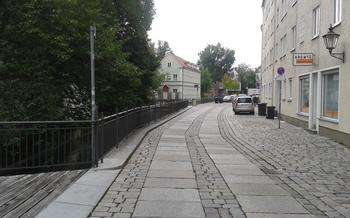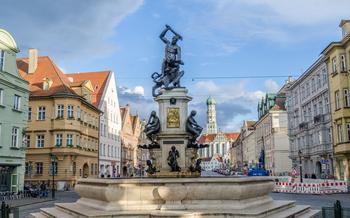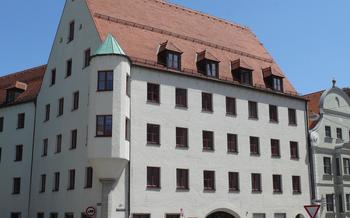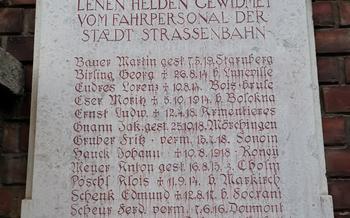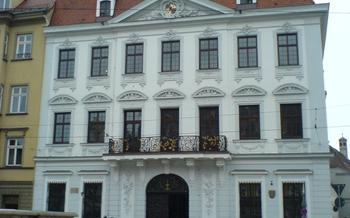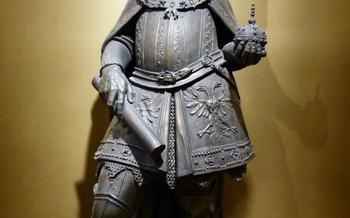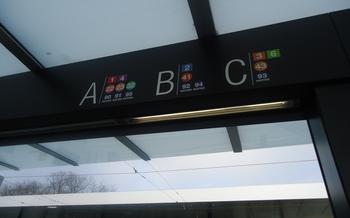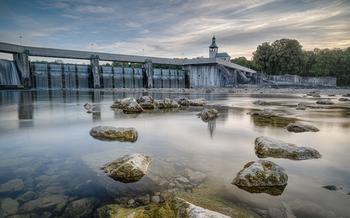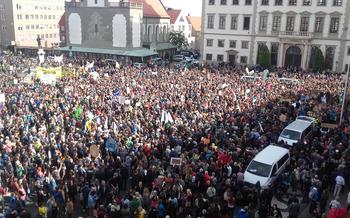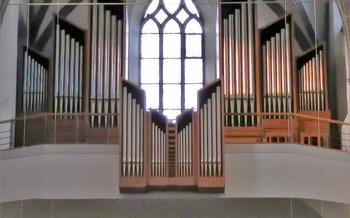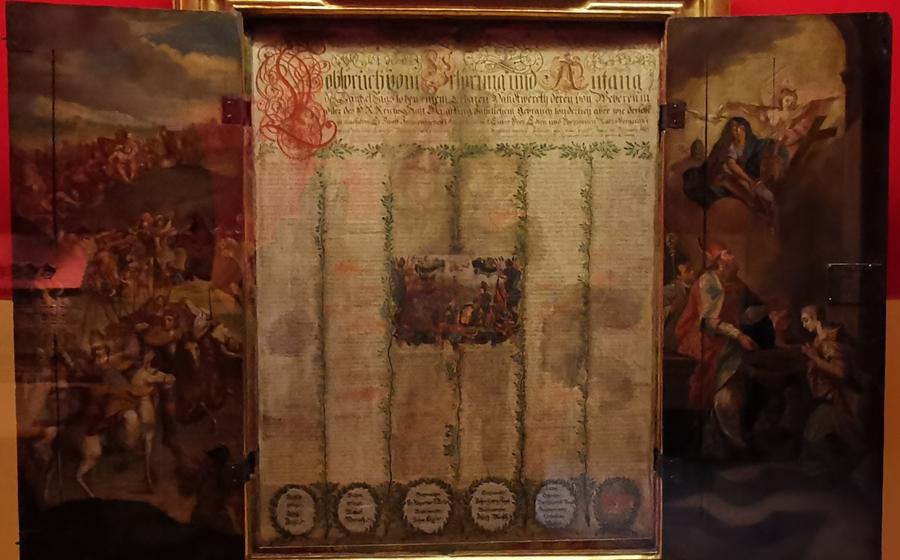
Textile and Industry Museum (TIM)
- Historical Significance
- TIM's Architecture and Design
- Permanent Exhibitions: Exploring Augsburg's Textile Legacy
- Temporary Exhibitions: Exploring New Perspectives
- Educational Programs and Workshops
- Interactive Exhibits: Engaging the Senses
- Guided Tours: Exploring History with Expert Insight
- Special Events and Programs
- Textile Collection: A Journey Through Fabric and Time
- Industrial Heritage
- Museum Shop:
- Accessibility:
- Location and Transportation:
- Insider Tip:
Historical Significance
Augsburg, a city with a rich textile heritage, played a pivotal role in the development of the textile industry in Germany. During the Middle Ages, the city was renowned for its linen and wool production, and by the 16th century, it had become a major center for textile manufacturing. The establishment of the Fugger family, a prominent merchant family, further solidified Augsburg's position in the textile trade. The Fuggers' extensive business network and their investments in textile production transformed the city into a thriving hub of textile commerce.
This flourishing industry not only brought economic prosperity to Augsburg but also shaped its cultural and social landscape. The textile trade attracted skilled workers and artisans from across the region, leading to a diverse and vibrant community. The city's wealth and influence, fueled by its textile production, allowed for the construction of magnificent buildings, such as the Town Hall and the Fuggerei, a social housing complex founded by the Fuggers. Augsburg's textile industry left an indelible mark on the city's history, transforming it into a prominent center of textile production and trade that continues to be celebrated and explored at the Textile and Industry Museum.
TIM's Architecture and Design
The Textile and Industry Museum (TIM) is housed in a striking former textile factory, a testament to Augsburg's rich industrial heritage. The building itself is a masterpiece of industrial architecture, blending historical charm with modern functionality. Its red brick façade, arched windows, and sawtooth roofline are reminiscent of the city's textile past.
Inside, the museum's exhibits are thoughtfully integrated with the building's original features, creating a unique and immersive experience. Visitors can admire the original machinery, iron beams, and exposed brick walls, which serve as a backdrop to the museum's displays.
One of the most impressive architectural features of TIM is its central atrium, which once housed the factory's spinning machines. Today, this vast space serves as a gathering place for visitors, with its soaring ceilings, exposed steel beams, and glass panels creating a sense of awe and wonder.
Permanent Exhibitions: Exploring Augsburg's Textile Legacy
TIM's permanent exhibitions offer a captivating journey through the rich textile history and industrial heritage of Augsburg. The "Textile Factory" exhibition takes visitors back in time to the bustling factories that once defined the city's landscape. Here, visitors can see firsthand the machinery and equipment used in the various stages of textile production, from spinning and weaving to dyeing and finishing. Interactive displays and hands-on exhibits allow visitors to experience the processes involved in creating textiles, from the raw materials to the finished product.
The "Industrial Culture" exhibition delves into the broader industrial landscape of Augsburg, showcasing the city's significant contributions to fields such as engineering, mechanical engineering, and other industries. Through artifacts, machinery, and multimedia presentations, visitors can learn about the innovations and inventions that shaped Augsburg's industrial development. The exhibition highlights the ingenuity and perseverance of the city's industrialists, who played a crucial role in shaping Germany's industrial prowess.
Together, the permanent exhibitions at TIM provide a comprehensive overview of Augsburg's textile and industrial heritage, offering visitors a deeper understanding of the city's past and its enduring legacy as a center of innovation and craftsmanship.
Temporary Exhibitions: Exploring New Perspectives
TIM's temporary exhibitions add a dynamic dimension to the museum experience, offering visitors a diverse range of topics and perspectives related to textiles and industry. These exhibitions showcase the museum's commitment to innovation and exploration, delving into various themes that complement the permanent collection.
Previous temporary exhibitions have covered a wide spectrum of subjects, from the history of fashion and design to the impact of industrialization on society. Visitors have had the opportunity to explore the intricate world of textile arts, discover the stories behind iconic fashion designers, and gain insights into the technological advancements that have shaped our modern world.
These temporary exhibitions not only provide fresh perspectives on textile and industrial history but also encourage dialogue and critical thinking. They challenge visitors to consider the social, cultural, and economic implications of textiles and industry, fostering a deeper understanding of their enduring relevance in our lives.
By presenting a diverse range of temporary exhibitions, TIM remains at the forefront of textile and industrial heritage, offering visitors a dynamic and engaging museum experience that is constantly evolving.
Educational Programs and Workshops
The Textile and Industry Museum (TIM) offers a diverse range of educational programs and workshops that cater to visitors of all ages and interests. Designed to promote creativity, knowledge, and understanding of textile techniques and industrial processes, these programs provide a hands-on and immersive learning experience.
Children and families can participate in interactive workshops where they can learn about textile production, design their own fabrics, and engage in creative activities. These workshops foster imagination, develop fine motor skills, and encourage children to explore their artistic talents.
For adults and enthusiasts, TIM offers specialized workshops and courses that delve deeper into the world of textiles and industry. Participants can learn traditional weaving techniques, experiment with natural dyes, or gain insights into the history of fashion and clothing. These workshops provide a unique opportunity to acquire new skills, connect with like-minded individuals, and expand their knowledge of textile arts and industrial heritage.
The museum also collaborates with schools and educational institutions to develop tailor-made programs that align with specific curricula. These programs bring textile history and industrial processes to life for students, fostering a deeper appreciation for the contributions of the textile industry to society.
Through its educational programs and workshops, TIM creates a dynamic and engaging environment where visitors can explore, learn, and create, fostering a lasting interest in the rich textile and industrial heritage of Augsburg.
Interactive Exhibits: Engaging the Senses
TIM offers visitors a range of interactive exhibits that provide immersive and engaging experiences. These interactive elements bring the textile and industrial history of Augsburg to life, allowing visitors to engage with the exhibits on a deeper level. Visitors can explore the museum's collection of textiles and artifacts firsthand through touchscreens, multimedia displays, and hands-on stations.
One of the highlights of the interactive exhibits is a replica of a weaving loom where visitors can try their hand at weaving. This hands-on experience provides a glimpse into the intricate process of textile production and allows visitors to appreciate the skill and craftsmanship involved.
Another popular interactive exhibit is a machine that demonstrates the process of spinning yarn. Visitors can observe the machine in action and learn about the different stages involved in creating yarn from raw fibers.
The museum also features a multimedia display that showcases the evolution of the textile industry in Augsburg. Visitors can explore interactive timelines, view historical photographs, and listen to audio recordings that provide insights into the city's rich textile heritage.
Guided Tours: Exploring History with Expert Insight
To fully immerse yourself in the rich history of Augsburg's textile and industrial heritage, guided tours are a must. Experienced guides lead visitors through the various exhibits, providing in-depth insights and expert knowledge that bring the museum's collections to life.
General tours offer a comprehensive overview of TIM's permanent and temporary exhibitions, delving into the stories behind the artifacts, machinery, and interactive displays. Thematic tours focus on specific aspects of the museum's collection, such as the history of textile production, the role of the Fugger family, or the impact of industrialization on Augsburg's development.
Group tours are available for schools, organizations, and other groups, allowing for a customized experience tailored to their specific interests. These tours can be arranged in advance to accommodate larger groups and ensure a personalized visit.
Whether you're a history buff, a textile enthusiast, or simply curious about Augsburg's past, guided tours at TIM offer an unforgettable journey through the city's industrial heritage.
Special Events and Programs
The Textile and Industry Museum (TIM) hosts a diverse range of special events, workshops, and programs throughout the year, offering visitors unique cultural experiences and opportunities to engage with the museum's exhibits and themes. These events and programs connect the museum with the local community and provide a platform for showcasing textile traditions and industrial heritage.
Past events have included textile markets, where visitors can browse and purchase a variety of handmade textiles, fabrics, and crafts from local artisans. Craft demonstrations and workshops allow visitors to learn traditional textile techniques and create their own textile-inspired projects. Themed workshops and events delve into specific aspects of textile and industrial history, offering in-depth insights and hands-on experiences.
These special events and programs cater to a wide range of interests and age groups, making TIM a vibrant and dynamic cultural hub. They provide visitors with opportunities to learn, create, and connect with the rich textile and industrial heritage of Augsburg.
Textile Collection: A Journey Through Fabric and Time
TIM's extensive textile collection is a testament to the city's rich textile heritage. Comprising a diverse range of fabrics, garments, and artifacts, the collection offers a glimpse into the artistry and craftsmanship that have shaped Augsburg's textile traditions. From intricate tapestries and delicate laces to finely tailored garments and vibrant prints, the collection showcases the skill and creativity of textile artisans throughout history.
Among the highlights of the collection are rare and unique pieces that tell compelling stories of textile production and innovation. Visitors can marvel at exquisitely embroidered garments that adorned the wealthy elite, admire the intricate patterns and motifs of hand-woven textiles, and trace the evolution of fashion trends through the centuries. The collection also features examples of traditional textile techniques, such as spinning, weaving, and dyeing, providing insights into the processes that transformed raw materials into beautiful fabrics.
TIM's textile collection serves as a valuable resource for researchers, designers, and textile enthusiasts alike. It offers a tangible connection to the city's textile past and inspires contemporary textile artists to draw on the rich traditions and techniques that have shaped Augsburg's textile legacy.
Industrial Heritage
Augsburg's industrial heritage is deeply intertwined with its textile industry, which played a pivotal role in shaping the city's identity and economy. The Textile and Industry Museum (TIM) serves as a testament to this rich industrial legacy. Its exhibits and programs explore the various industries that have contributed to Augsburg's development, showcasing the machinery, tools, and innovations that transformed the city into a leading industrial hub.
TIM's exhibits highlight the textile industry's profound impact on Augsburg's economy and society. Visitors can learn about the processes of spinning, weaving, dyeing, and printing, and witness the evolution of textile machinery from simple handlooms to sophisticated power looms. The museum also delves into the social and cultural aspects of the textile industry, shedding light on the working conditions, labor movements, and the rise of trade unions.
Beyond textiles, TIM also explores other industries that have shaped Augsburg's industrial landscape. Exhibits on engineering, mechanical engineering, and metalworking showcase the city's expertise in these fields. Visitors can marvel at the intricate machinery, steam engines, and locomotives that were instrumental in Augsburg's industrial growth.
Through its exhibits and programs, TIM preserves and celebrates Augsburg's industrial heritage, providing visitors with a deeper understanding of the city's transformation from a medieval trading center to a modern industrial powerhouse.
Museum Shop:
Step into the TIM museum shop and discover a treasure trove of unique souvenirs and merchandise inspired by textiles and industrial history. Browse through a carefully curated selection of books, textiles, souvenirs, and handcrafted items that celebrate the rich heritage of Augsburg. The museum shop is not just a place to purchase mementos; it is also a platform that supports local artisans and promotes the preservation of textile traditions. Each purchase made at the shop contributes to the continuation of these valuable crafts and skills. So, whether you're looking for a special gift or a piece of history to take home, the TIM museum shop is the perfect place to find it.
Accessibility:
The Textile and Industry Museum (TIM) is committed to providing an inclusive and accessible environment for all visitors, regardless of their abilities. The museum features wheelchair accessibility throughout its premises, including ramps, elevators, and accessible restrooms. Visitors with disabilities can easily navigate the museum's galleries, workshops, and educational spaces. The museum staff is also trained to assist visitors with disabilities and ensure that they have a comfortable and enjoyable experience. TIM strives to create a welcoming environment where everyone can learn about and appreciate the rich textile and industrial heritage of Augsburg.
Location and Transportation:
The Textile and Industry Museum (TIM) is conveniently located in the heart of Augsburg, easily accessible by various modes of transportation. Its address is Provinostraße 46, 86153 Augsburg, Germany. The museum is situated within walking distance of the city's main railway station, Augsburg Hauptbahnhof, making it convenient for visitors arriving by train. Additionally, the museum is well-connected by public transportation, with bus and tram stops located nearby. Visitors can use the AVV (Augsburg Verkehrs- und Tarifverbund) public transportation system to reach the museum. For those traveling by car, TIM offers on-site parking, ensuring a hassle-free visit. A map or directions to the museum can be found on the museum's website or obtained from the tourist information center in Augsburg.
Insider Tip:
For a unique and immersive experience, plan your visit to coincide with one of TIM's special events or workshops. These events often feature live demonstrations of textile techniques, hands-on workshops, and themed exhibitions. Check the museum's website or social media channels for upcoming events and programs. After exploring the museum, take a short walk to the nearby Augsburger Puppenkiste, a renowned puppet theater that offers delightful performances for all ages.
